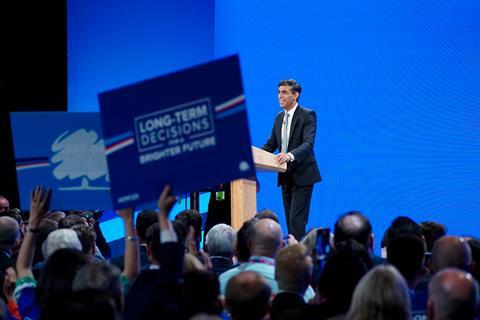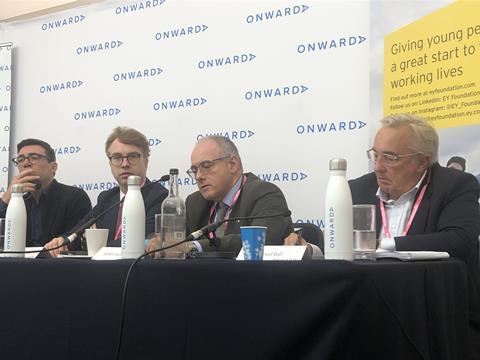This party conference will long be remembered as the place HS2 died. But rail was far from the only topic on the agenda in Manchester, as Daniel Gayne reports

By the time Rishi Sunak took to the stage in Manchester yesterday, there was no secret about what he was about to do.
Having refused to be “rushed” into a decision, the question of HS2’s future had inevitably come to dominate the Conservative Party’s annual conference in the northern city, despite the desperate attempts of MPs to talk about anything else.
Ultimately, Sunak did as he had been expected, cancelling the later phases of the project, with a slew of alternative transport links identified as more worthy recipients of the money.
Exactly how many of the projects included in the prime minister’s Network North are new is still being worked out – the fact some of them appear to have been built already will inspire confidence in nobody – but one thing that is clear is that the last day of the conference will be remembered as the day HS2 died.
Given current polling, it is quite likely that Sunak will not get to implement the other headline policies from his speech – a gradual ban on cigarette sales and a reform to A-Levels. By comparison, he seems keen to make his rail shake up stick. A re-designed six-platform Euston will not have the capacity for the future development of the northern leg of the line, while supporting documents for the policy say the government will proceed immediately with land sales north of Birmingham.
Plenty of talk about housing, but little new of substance
While you could be forgiven for thinking so, HS2 was not the only thing people were talking about. Housing was a major talking point, though not among the leadership. For a speech that was nominally about “long-term decisions for a brighter future”, it is a little surprising that Sunak did not mention the topic at all.
Perhaps more disappointing for those in the industry was the fact that the housing secretary, Michael Gove, did not seem much interested in talking about the topic either. His barnstorming speech was full of jibes at the Labour Party, but did not contain anything you could call policy. The one morsel thrown to the sector was a promise, made at a fringe event, to bring forward reforms to nutrient neutrality rules through standalone legislation “at the first available opportunity”.

Despite the relative silence on the housing issue from the Tory top brass, it was a major topic at the conference fringe, with housing minister Rachel Maclean seemingly one of the busiest fringe speakers in the party. It perhaps tells you something about the stability of housing policy in this country that Maclean felt it necessary at the beginning of one Policy Exchange fringe event to point out that she was now the longest serving housing minister since Kit Malthouse.
Six others have filled the role between Malthouse’s promotion in July 2019 and Maclean’s appointment in February of this year.
The minister stressed that she was “really very, very agitated by the plight of SME builders, small builders and self- and custom builders who have had an absolutely torrid time of it”, and this concern was a driving force behind the government’s plans to address nutrient neutrality rules, which she said was “capturing more of them than anybody else”. She said there was more to be done in removing “onerous” planning regulation and that she wanted to remove some of the “discretionary nature” out of the regime.
But she warned that there would be no simple fix for the housing crisis. “If this was easy, we could just get the chancellor to write a massive cheque,” she said, before correcting herself: “Well, that’s not easy in itself”.
Apprenticeships remain priority in DfE
Skills and apprenticeships were another favourite topic at the conference. At an Onward event, Robert Halfon, skills minister, criticised New Labour for its stress on university and for diminishing the importance of vocational skills. For too long he said, the focus has been on “quantity over quality, when we should have been focused on skills, skills, skills”. He added that there needed to be change of attitudes to those who take the apprenticeship route, claiming that in Switzerland the 70% of the population who make this choice are seen as prestigious.

His secretary of state, Gillian Keegan, echoed these comments on a different fringe event, where she explained her decision to introduce degree apprenticeships for a variety of white collar professions as part of an effort to “change every middle class mind in the country” about apprenticeships.
However, there was some criticism – including from Tory MPs – on the difficulties caused by the apprenticeship levy “About 90% of our employers are small employers and SMEs, but they have not got the bandwidth to deal with the paperwork that comes with the apprenticeship levy, finding providers – it’s a bit of a ball ache,” said Siobhan Baillie, MP for Stroud.
Labour’s regional leaders Andy Burnham and Steve Rotherham also appeared on fringe events to talk about how devolution could aid up-skilling. “We can quickly respond to the needs of our area, much more than the monolith in Westminster,” said Rotherham, while Burnham spoke about his Manchester Baccalaureate – a policy which will offer a less academically-focused route to children at age 14. Unlike the English baccalaureate, which is focused on the subjects most demanded by universities, his new system will include “the GCSEs that the employers in our region value”. Young people could then apply for work placements through a UCAS-style system called GMAX. “You just need that little bit of localisation to make it meaningful for the place you’re in – so the West Midlands perhaps would have lots of automotive in,” he said.
Battlelines drawn for future civil war
Time will tell whether Sunak-the-reformer will be more popular among voters than Sunak-the-bland-administrator, but many big figures at the conference appeared to be laying the groundwork for a future leadership fight.
Home secretary Suella Braverman’s pitch to the tory right enraged Conservative London Assembly member Andrew Boff so much that he was ejected from the conference centre for heckling.
The rhetoric of Braverman and her likely rival Kemi Badenoch, was widely perceived as anti-immigration, anti-woke, anti-net zero. It is is unlikely to bring much comfort to an industry that has embraced diversity, environmental targets and is in desperate need of skilled labour.
The packed room attracted by Britain’s shortest-lived prime minister gave a hint to the priorities of another section of the Tory base. Liz Truss had not changed her tune much from her time in Downing Street and at her Great British Growth Rally, she urged aggressive tax cuts to stimulate growth. Some of these, she suggested could be used to incentivise the building of 500,000 new homes each year in order to bring down house prices.

“While lots of members of parliament talk about building more homes it’s very difficult to actually get them to vote to reduce the regulation that is stopping the homes being built,” she said. “It’s all about protecting newts, or installing a bat bridge. That appears to be the priority, rather than building homes. I think we need to turbocharge the incentives.” Truss received a rapturous reception among the Tory faithful and with reports that 60 MPs have joined her Growth Group, it seems she could yet wield some influence in British politics.
The Conservatives’ moderate, “one nation” wing garnered rather less press than the tax cutters and border shutters, but they were present at the conference nonetheless, with many of them huddled in the marquee of Onward, which appears to have become the in-house think tank of levelling up. That phrase may have exhausted its use as a political slogan, but the idea of place-based growth, enabled by strategic intervention by government, seems to have become the central plank of the Tory centre-right. At one Onward fringe, science minister George Freeman described levelling up as a “moral imperative” and insisted the ambition still united Tories.
>> DLUHC unveils £1.1bn funding for ‘left-behind’ towns
On the same panel, the CBI’s director general Rain Newton-Smith praised levelling up and the devolution agenda, saying regional leaders understood better “what levers to pull” to accelerate growth and urging the government to roll out devolution settlements to all the English regions that want them. “We are less than a decade into English regional devolution and yet I think we’re already seeing some of the benefits around the UK of those regional and place-based growth strategies,” she said.
Whether this moderate and implicitly cross-party approach to politics has a future of success within the Conservative Party is open to question. For now, all eyes turn to Liverpool, where Labour holds its own conference this weekend.


























No comments yet